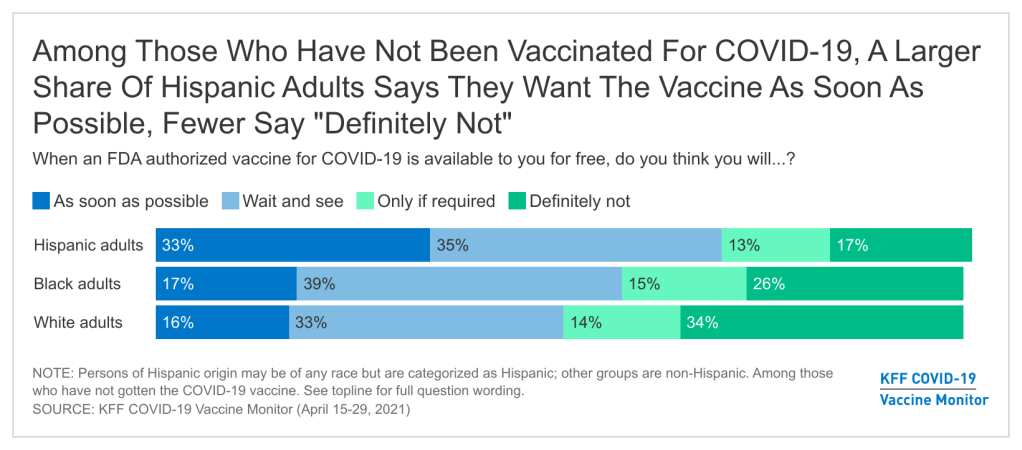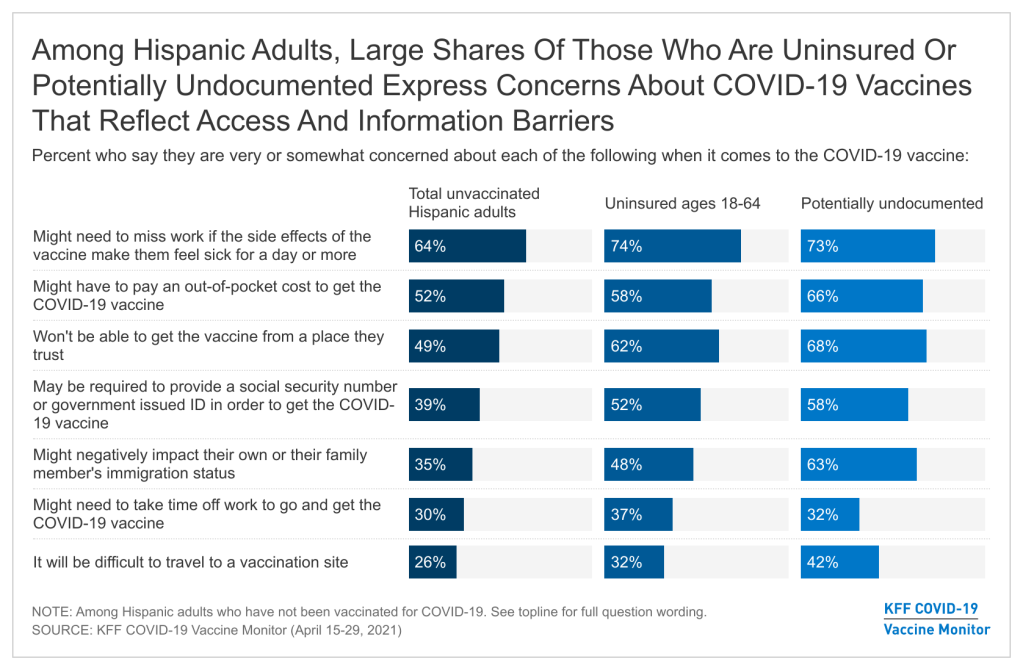
The independent source for health policy research, polling, and news.
Vaccine Monitor: Unvaccinated Hispanic Adults are Twice as Likely as White Adults to Want a COVID-19 Vaccine ASAP, Highlighting a Key Outreach Opportunity for Vaccination Efforts
Fears About Costs and Documentation Requirements Pose Potential Barriers for Some Hispanic Adults
Nearly Two-Thirds of Unvaccinated Hispanic Adults Worry about Missing Work due to Vaccine Side Effects
A third (33%) of unvaccinated Hispanic adults say they want to get a COVID-19 vaccine as soon as possible – twice the share as among unvaccinated White (16%) or Black (17%) adults, presenting an opportunity for targeted outreach to boost overall vaccination rates, according to a new KFF COVID-19 Vaccine Monitor report focused on the vaccine views and experiences of Hispanic adults.
The higher share of Hispanic adults who want to get vaccinated quickly but have not yet reflects some significant access barriers and information gaps identified by the Monitor, including concerns about potential costs, lost wages, and immigration-related issues.
“With so many unvaccinated Hispanic adults eager to get a shot, there’s an opportunity to further close the gap in vaccination rates by addressing worries about costs and practical concerns such as time off work,” said Liz Hamel, a KFF vice president and director of KFF’s public opinion and survey research.
Overall, nearly half (47%) of all Hispanic adults say they’ve already gotten at least one dose of a COVID-19 vaccine, lagging behind the rate for White adults (60%) but similar to the rate for Black adults (51%).
Among all unvaccinated Hispanic adults, nearly two thirds (64%) are concerned about missing work due to side effects, and half (52%) worry they may have to pay out-of-pocket for the vaccine – even though all adults nationally cannot be charged to get the vaccine.
Though the federal government has made clear that vaccines should be available to people regardless of their immigration status, 4 in 10 unvaccinated Hispanic adults (39%) say they are concerned that they might be required to provide a Social Security number or government-issued identification to get vaccinated, and about a third (35%) are concerned that getting a vaccine might negatively affect their own or a family member’s immigration status.
Those fears reflect how vaccines are being administrated in some locations. Even though the vaccine is available to all adults in the U.S, regardless of their immigration or insurance status, more than half (56%) of Hispanic adults who have been vaccinated say they were required to show a government-issued identification when they received the vaccine, and 15% say they were asked to provide a Social Security number. Nearly a quarter (23%) say they were asked for health insurance information.
Unvaccinated Hispanic adults who are uninsured or potentially undocumented in general are more concerned than other Hispanic adults about both immigration- and cost-related issues.
Information gaps also may be contributing to these concerns. Less than half of Hispanic adults know that the vaccines are free for all U.S. residents (46%) and that all adults are eligible regardless of immigration status (42%).
With all adults now eligible to get vaccinated nationwide, a much larger share of unvaccinated Hispanic adults (42%) than unvaccinated White adults (26%) are unsure if they are eligible to receive the vaccine in their state. Among Hispanic adults who are potentially undocumented, more than half (57%) are unsure about their eligibility.
Opportunities for Expanding Vaccination Rates Among Less Eager Hispanic Adults
The Monitor also examines several potential strategies that could affect the willingness of Hispanic adults to get vaccinated among those who have not already done so and aren’t hoping to do so as soon as possible.
Nearly half (46%) of this less-eager group say they would be more likely to get vaccinated if it were offered to them where they normally go for health care. That is twice the share as among White adults (23%).
Among those in this group who are employed, more than half (54%) say they would be more likely to get it if their employer gave them paid time off to recover from side effects, nearly three times the share among White workers (19%). In addition, 38% of less-eager Hispanic workers say they would be more likely to get vaccinated if their employer arranged for a medical provider to administer the vaccine at their workplace, compared to 14% of similar White workers.
Employer financial incentives to get vaccinated also could encourage vaccination among less-eager Hispanic workers. Nearly 4 in 10 (38%) of this group say they would be more likely to get a vaccine if their employer offered them a $200 incentive to do so.
International travel requirements also could motivate significant shares of less-eager Hispanic adults to get vaccinated: 41% say they would be more likely to get vaccinated if it were required to travel abroad, including nearly two-thirds (63%) of those born outside the United States.
Other key results include:
- Among those who have been vaccinated, Hispanic adults are twice as likely (22%) as White (11%) or Black (10%) adults to say they got their vaccine at a community health center. The share is even higher (30%) among those who primarily speak Spanish.
- About half of Hispanic adults who have been vaccinated or tried to make an appointment did so online (48%), fewer than among White adults (58%). A quarter (25%) of Hispanic adults say they signed up or tried to sign up by phone, and another 16% say they did so in person.
- Most Hispanic adults who predominantly speak Spanish (68%) say it is easy to find COVID-19 vaccine information in Spanish, but 27% say it is difficult.
Hispanic Adults Are More Likely than White Adults to Say the Pandemic Negatively Affected Their Family’s Health and Finances
The report also examines some of the disproportionate impacts that the pandemic has had on Hispanic families:
- Hispanic adults are more likely than White adults to say someone in their family has tested positive for COVID-19 (28% vs.18%) or that a family member or close friend has died from it (38% vs.18%).
- Similarly, two-thirds (67%) of Hispanic adults say they are worried that they or someone in their family will get sick from coronavirus, including 41% who say they are very worried. The share who says they are very worried is four times higher among Hispanic adults than among White adults (10%).
- Hispanic adults are also more likely than White adults to say that the pandemic has negatively affected their personal financial situation (48% v. 36%). The shares are higher among Hispanic adults who predominantly speak Spanish (55%) and with household incomes less than $40,000 annually (56%).
“While the vaccines are available to all adults regardless of their insurance or immigration status, many Hispanic adults who have been vaccinated say they were asked for their health insurance information or a government-issued ID,” said Samantha Artiga, a KFF vice president and director of the racial equity and health policy program. “That can pose barriers for many, particularly those who are uninsured or are potentially undocumented immigrants.”

